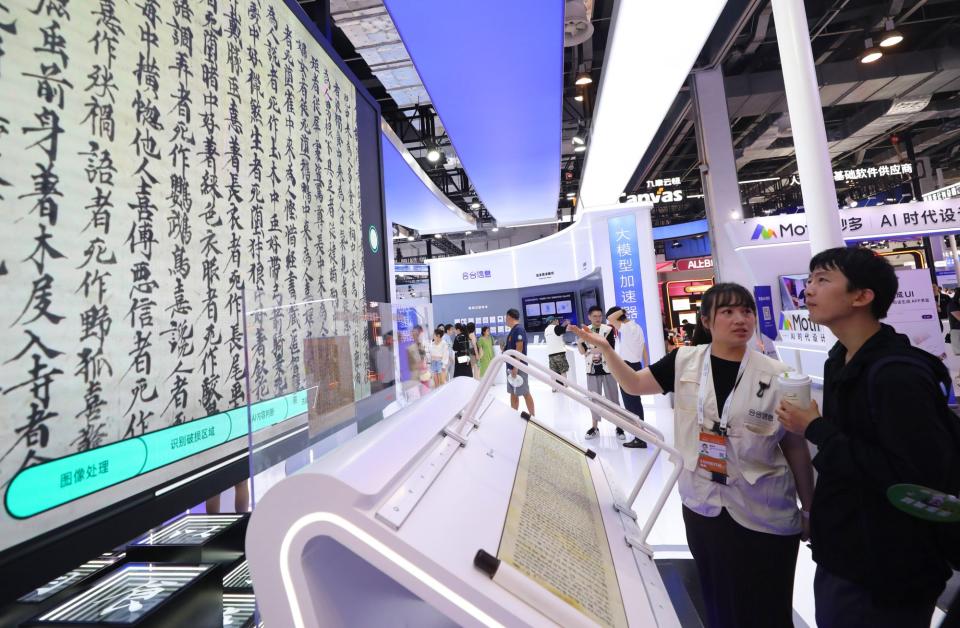ByteDance, Alibaba, SenseTime lead generative AI infrastructure services market in China
TikTok owner ByteDance, e-commerce giant Alibaba Group Holding and artificial intelligence (AI) specialist SenseTime are the top generative AI (GenAI) infrastructure services providers in China, according to market research firm IDC.
The three companies combined had a more than 50 per cent share of the market in the second half of 2023, according to a report on Tuesday by IDC, without offering each firm's exact share. Alibaba owns the South China Morning Post.
They lease software, computing power, storage and networking resources for enterprises to build applications using large language models (LLMs), the technology underpinning GenAI services like ChatGPT.
Do you have questions about the biggest topics and trends from around the world? Get the answers with SCMP Knowledge, our new platform of curated content with explainers, FAQs, analyses and infographics brought to you by our award-winning team.
GenAI refers to algorithms that can be used to create new content - including audio, code, images, text, simulations and videos - in response to short prompts.
The IDC data reflects how mainland China has swiftly become a world leader in GenAI adoption since OpenAI released ChatGPT in November 2022, which sparked an investment frenzy and soul searching on the mainland's technology industry.

A staff member shows how artificial intelligence-generated technology is used in restoring ancient books to a visitor during the 2024 World AI Conference in Shanghai on July 6, 2024. Photo: Xinhua alt=A staff member shows how artificial intelligence-generated technology is used in restoring ancient books to a visitor during the 2024 World AI Conference in Shanghai on July 6, 2024. Photo: Xinhua>
According to a survey of 1,600 decision-makers in industries worldwide by American AI and analytics software company SAS and Coleman Parkes Research, 83 per cent of Chinese respondents said they used GenAI.
That was higher than the 16 other countries and regions in the survey, including the United States, where 65 per cent of respondents said they had adopted GenAI. The global average was 54 per cent.
The entire intelligent computing market in China, which covers both GenAI and non-GenAI market segments, has seen larger contributions from GenAI applications, according to the IDC report. It said this market grew nearly 86 per cent to reach 11.4 billion yuan (US$1.6 billion), with GenAI infrastructure services providers contributing nearly 60 per cent of that growth.
With the fast-growing domestic demand for resources such as data centres to develop more GenAI applications, Beijing is looking to raise China's share of AI computing power to 35 per cent by the end of next year, up from 25.4 per cent in mid-2023.

A Yordando Technologies staff member discusses the firm's artificial intelligence-powered kitchen application to visitors during the 2024 World AI Conference in Shanghai on July 6, 2024. Photo: Xinhua alt=A Yordando Technologies staff member discusses the firm's artificial intelligence-powered kitchen application to visitors during the 2024 World AI Conference in Shanghai on July 6, 2024. Photo: Xinhua>
While China is second only to the US in aggregated computing power, concerns have risen about a fragmented market, the lack of chip supply for AI development, and difficulties in building indigenous computing power amid US export restrictions on advanced semiconductors.
China currently aims to build eight national computing power hubs and 10 national data centre clusters - a mega project called "Eastern Data and Western Computing" - which is expected to drive around 400 billion yuan in investment each year.
Before ChatGPT went viral in late 2022, some Chinese tech companies lost interest in AI and considered returning their orders of Nvidia's advanced A100 chips, according to Tan Dai, president of ByteDance's cloud computing services unit Volcano Engine, in a recent interview with Chinese media TMTPost. Volcano Engine topped IDC's ranking of GenAI infrastructure services providers in China.
Tan said ByteDance, which remained "bullish on AI", moved to acquire those chips, which are now much sought-after on the mainland. He pointed out that a number of domestic LLM developers, including Moonshot AI and 01.AI, initially trained their products on Volcano Engine's platform.
This article originally appeared in the South China Morning Post (SCMP), the most authoritative voice reporting on China and Asia for more than a century. For more SCMP stories, please explore the SCMP app or visit the SCMP's Facebook and Twitter pages. Copyright © 2024 South China Morning Post Publishers Ltd. All rights reserved.
Copyright (c) 2024. South China Morning Post Publishers Ltd. All rights reserved.

 Yahoo Finance
Yahoo Finance 